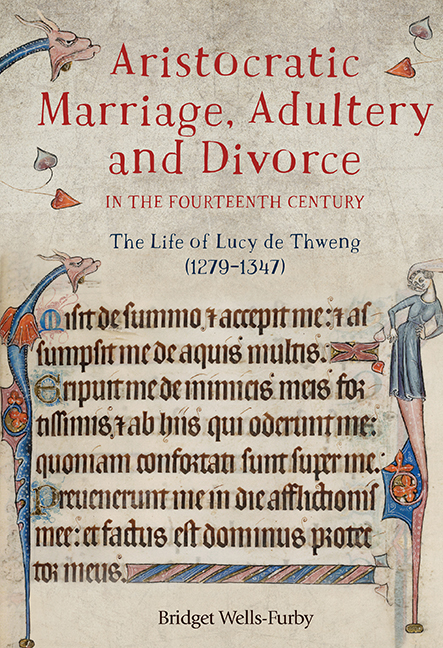 Aristocratic Marriage, Adultery and Divorce in the Fourteenth Century
Aristocratic Marriage, Adultery and Divorce in the Fourteenth Century Book contents
- Frontmatter
- Contents
- List of Illustrations
- Acknowledgements
- List of Abbreviations
- Note on the Text
- Introduction
- Map
- 1 Birth and Family; Inheritance and Disinheritance
- 2 Wardship and First Marriage
- 3 Separation and Divorce
- 4 Adultery and Fornication
- 5 Second Marriage
- 6 Widowhood
- 7 Third Marriage
- 8 Death
- Summary and Conclusions
- Bibliography
- Index
6 - Widowhood
Published online by Cambridge University Press: 04 April 2019
- Frontmatter
- Contents
- List of Illustrations
- Acknowledgements
- List of Abbreviations
- Note on the Text
- Introduction
- Map
- 1 Birth and Family; Inheritance and Disinheritance
- 2 Wardship and First Marriage
- 3 Separation and Divorce
- 4 Adultery and Fornication
- 5 Second Marriage
- 6 Widowhood
- 7 Third Marriage
- 8 Death
- Summary and Conclusions
- Bibliography
- Index
Summary
There is no direct record of Everingham's death, either an ordinary inquisition post mortem or an instruction to the escheator to take one, probably because he held no lands other than those by Lucy's settlement. Nevertheless, the escheator took possession of the lands and Lucy duly complained of this on the grounds that she held them in jointure. On 4 April 1316, a writ was issued to enquire into this and the resulting inquisition was held on 11 May. This found that her lands were held according to the settlements made in 1313 and on 18 May the escheator was ordered to hand them over to her, she having again done fealty.
Everingham's early, and perhaps unexpected, death gave Lucy and Meinill another opportunity to marry, but they did not do so. It has been seen that other couples with cherished illegitimate sons were married, but there were risks attached to this. The Hoghtons presumably hoped for a legitimate son but none was born and it was only after twenty years that they settled her estate on pre-nuptial Richard. Sir Theobald Trussell (d.1368) of Flore had a son and daughter by his mistress before marrying her, after which they produced a legitimate son who inherited, taking precedence over his older but illegitimate brother. In view of the fact that Meinill's commitment to their son only increased after 1316, with the addition of more lands to his prospective inheritance and possibly the arrangement of his marriage, it may be that he and Lucy did not marry in order to avoid the possibility of another son and to protect Nicholas's position. The settlement of 1314, made perhaps when Meinill believed he would never have an opportunity to marry Lucy but which was such a pointed declaration of his commitment to her and their son, may then have prevented them from regularising their position. It is particularly significant that neither married anyone else. Meinill remained single, highly unusually, content with Lucy's son as his heir, accepted as such by his family and peers as though he and Lucy had been married. She was still only thirty- seven in 1316 and no doubt remained very attractive to other suitors.
- Type
- Chapter
- Information
- Aristocratic Marriage, Adultery and Divorce in the Fourteenth CenturyThe Life of Lucy de Thweng (1279–1347), pp. 155 - 165Publisher: Boydell & BrewerPrint publication year: 2019
